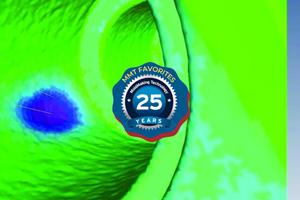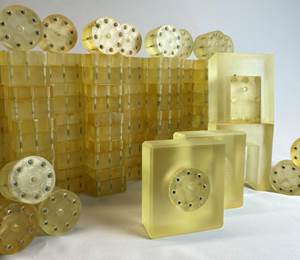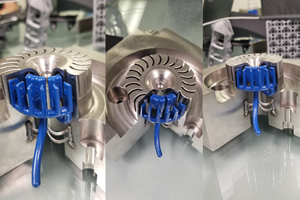Feature-Based CAM Software Helps Solves Problems
For moldmakers considering jumping into aerospace work, you may be interested in the success story of one tool and die shop using feature-based CAM with Boeing Aircraft.
“Our customers view us as their problem-solvers and as the company that is willing to do what others aren’t willing, or able, to do,” claims Scott Garbarino, VP and COO of Pacific Tool Inc. (PTI)—long a major producer of tooling for Boeing Aircraft. A big part of that capability is the company’s FeatureCAM feature-based CAM software from Delcam.
Scott’s father, Frank Garbarino, opened PTI in 1966 after buying with two partners the Seattle tool and die shop where he worked. He eventually bought out his partners and since then he and Scott have grown PTI to its current size and level of service—more than 45 employees.
Boeing represented a substantial amount of the company’s initial business, as engineers and pur¬chasing managers knew Mr. Garbarino from his previous employment. PTI serviced Boe-ing so well that it consistently received gold and silver ratings from the company. With the subsequent reductions in its number of small tool suppliers, Boeing has pared them down from hundreds to just16, including PTI.
Despite this success, PTI has made a concerted effort to acquire additional customers. “We knew that Boeing has ebbs and flows and that if we were going to manage our business and retain our staff, we needed more customers, more di¬versification,” Scott Garbarino comments.
FeatureCAM has contributed to that expansion. “We’ve purchased a number of software packages for our business over the years,” Mr. Garbarino ssys. “When the sales engineer from FeatureCAM came to see us initially a few years ago, he showed us how much faster we could make a part with that software.”
Since their initial purchase of FeatureCAM, the company has been delighted with its selection. Hank Francis, lead programmer for PTI, is a complete believer in the package and the support he receives from Delcam. “Their fundamental business model mirrors ours,” he claims. “If we have a problem, the Delcam team responds within hours. Our previous software providers would respond in days or even weeks.”
“Feature-based machining frees you from the time-consuming chore of creating and managing each machining operation,” he adds. “Since there are fewer objects to manage, programming is accomplished more easily and with fewer errors.”
Long before most machine shops thought about certifying to the rigorous ISO/AS9100 standards, PTI achieved this mile¬stone in 2002. This accreditation enabled the company to retain its substantial business with Boeing, as well as to secure business from other companies in the aero¬space industry.
“Many of our employees have been with PTI for more than 20 years, and our staff of 45 includes expert craftsmen with decades of experience,” says Mr. Garbarino. To secure new young talent who are known performers, he retains a relationship with the local high-school technical teachers.
To meet its customers’ delivery schedules, PTI regularly purchases the latest CNC machines. The most recent acquisition, a Mori Seiki MZ2000T3 Y3, was added specifically to make parts for a new customer. “When we needed complex post-proces¬sor coding support for our new Mori Seiki, the Delcam engineering team turned the code around to us in days,” remembers Mr. Garbarino. “The people there are absolutely superior to any software provider we have worked with.”
Related Content
How to Clean and Maintain Molds With Intricate Conformal Cooling Channels
A water-based, eco-friendly plastic mold cleaning system helps Rankine-Hinman Manufacturing restore flow rates and avoid big-ticket failures on complex and costly molds.
Read MoreCT Scanning Helps Micro Molder Reduce Cost of First Article Inspections
CT scanning services performed by 3D ProScan, a division of NyproMold Inc. provides MTD Micro Molding with accurate, high-resolution internal and external measurements performed about seven times faster and at significant cost savings.
Read MoreIn "Hybrid" FIM Process, 3D Printing Complements Injection Molding
Alpine Advanced Materials used a desktop 3D printer and the freeform injection molding process to reduce prototype tooling production time and cost for its customers.
Read MoreLarge Hybrid Steel Insert Solves Deformation, Dimensionality, Cycle Time Problems
DMLS printers using metal additive powders selected by Linear AMS to produce high-quality, accurate, consistent 3D-printed mold components with certification and traceability.
Read MoreRead Next
Reasons to Use Fiber Lasers for Mold Cleaning
Fiber lasers offer a simplicity, speed, control and portability, minimizing mold cleaning risks.
Read MoreHow to Use Continuing Education to Remain Competitive in Moldmaking
Continued training helps moldmakers make tooling decisions and properly use the latest cutting tool to efficiently machine high-quality molds.
Read MoreAre You a Moldmaker Considering 3D Printing? Consider the 3D Printing Workshop at NPE2024
Presentations will cover 3D printing for mold tooling, material innovation, product development, bridge production and full-scale, high-volume additive manufacturing.
Read More


















